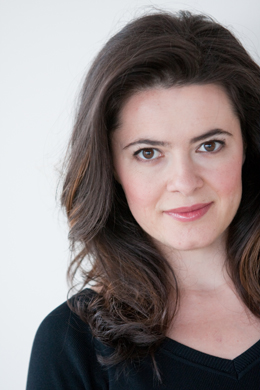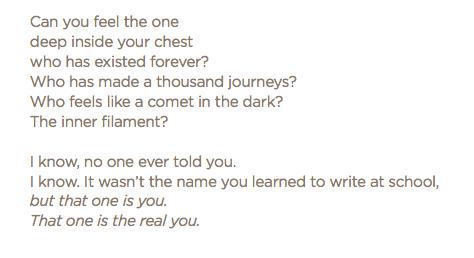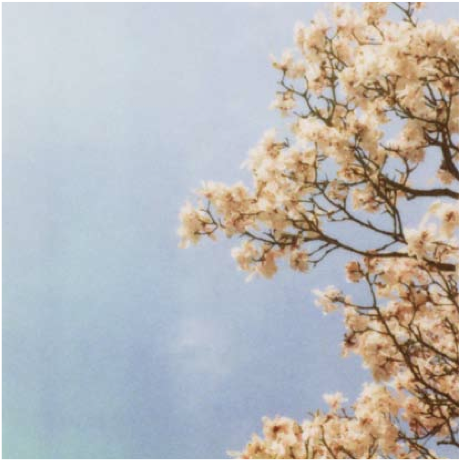Tara Sophia Mohr: On Being a Cauldron for the Feast of Light
 In my work over the past year or so I've become enamored with the muse, 'flow' and the creative process. In that place where spirit moves directly through me -- merging somehow with my essence and guiding the work -- is where the greatest stuff is born.
I was moved when I perceived this essence in the poetry work of Tara Sophia Mohr. There's an ineffable deliciousness in the writing that can only be driven by such grace. Truth. Soft and gentle, yet fiercely alive. I've never been a big fan of poetry, but this I can relate to -- I was moved to tears just a few poems in to her newly released book, Your Other Names: Poems for Wise Living.
In my work over the past year or so I've become enamored with the muse, 'flow' and the creative process. In that place where spirit moves directly through me -- merging somehow with my essence and guiding the work -- is where the greatest stuff is born.
I was moved when I perceived this essence in the poetry work of Tara Sophia Mohr. There's an ineffable deliciousness in the writing that can only be driven by such grace. Truth. Soft and gentle, yet fiercely alive. I've never been a big fan of poetry, but this I can relate to -- I was moved to tears just a few poems in to her newly released book, Your Other Names: Poems for Wise Living.
In my quest to unearth the principles of this work I've decided to create an occasional interview series to learn from the 'creative alchemists,' and perhaps also inspire you in your own work. This is the first...
In one of your poems you write, “Don’t forget your true name: strong cauldron for the feast of light.” What is it you're really getting at...?
In my classes, I ask people to consider: “What if you saw yourself as a cauldron for a great feast of light? What if that was literally how you thought of yourself? How would that change how you go about your day? How would that change how you speak to your children, or your spouse? How would that change how you approach your work?”
For me, this line says something about who we really are as human beings, who we are meant to be -- containers of a abundant, burning light.
I can’t define it more than that, because I think poetry says things that can’t be boiled down to more literal prose. But I invite anyone to sit with the phrase, and find out what it means to you.
With all my poems, I don’t start with a meaning or agenda in my head, and make a poem about it. I open myself up and I am taught by what shows up. I am surprised and opened and delighted by the ideas. The poetry leads. So, I too am a student, learning what it means to be “a strong cauldron for the feast of light.”
Why did you write this book -- what was your real motivation?
I had been writing about personal growth and well-being in prose for a couple of years. At some point, the writing started coming in poetic form. It felt as if, after daily prose writing for a couple of years, I had gone deep enough into creative practice, into shutting down the critical mind and opening up the creative mind, that I could start hearing and expressing in poetry.
I was struck by the fact that the poems seemed to offer a very different message than the “self-help” type writing I was doing. The self-help type writing was all about how to improve your life, get from Point A to Point B: How to pursue your passion; how to be happier; how to have a more fulfilling career. There was always an underlying sense of trying to get somewhere else.
The poems, in contrast, were about the glory of what is. The poems were teaching me about that.
The glory of what is isn’t dependent on our life circumstances. It comes from the very nature of what life is, and the very nature of who we are. Sacred. Glorious. Alive.
This -- the glory of what is -- seemed to be a deeper, more freeing, more transformational message than any life improvement messages I could share. Because I believe that message is so important, and so transformative, I decided to do a book of the poems.
 What feels really good about having completed this?
What feels really good about having completed this?
Trusting myself to do a poetry book. For the past year or so, I’ve been talking with people from the New York publishing industry -- I’ve been very blessed that there has been a lot of interest in publishing a book by me. But they were all interested in a traditional prose personal-growth book, not a poetry book. The conventional wisdom is that there is not a substantial market for poetry.
And yet there I was, feeling more compelled by my poetry than by my other writing, and seeing that my poetry was helping people in a powerful way.
Eventually, I got clear that yes, this -- getting my poetry out there -- was the direction I felt pulled by, and I wanted to trust that pull.
What would you say to someone who feels they might have something like this in them, but is resisting the call?
First, laugh a little at yourself, and give yourself a few nurturing shoulder rubs, to loosen up the tension.
In the archetypal hero’s journey, which shows up in myths and literature from various cultures around the world, Step 1 of the journey is “Hearing the Call.” Step 2 is “Resisting the Call.”
So, congratulations, you are on the path!
We can giggle a little at ourselves and have compassion: what each of us feels called to do will feel daunting to us.
Callings stretch us-- they literally enlarge our capacities. So at the outset, we all hear the call but rationally think: “Oh, there is no way I could do that!” Or, “Who am I to take on that project?”
I just saw the last Harry Potter film, and it reminds me of that. Harry Potter is a contemporary myth that resonates with all of us, because when it comes to our life quests, we are all that tiny, clueless Harry Potter up against the huge monster -- that’s how our size feels relative to the size of the work we feel called to do.
But people! Our world is falling apart. There is important work to be done and you’ve been assigned an important part of it. Given that you are a miraculous human being, and that you have so much power available to you if you ask for it, you’ll do just fine. You are up to the task, even if a voice in your head is telling you otherwise.
In the book you say, “For me there is no writing poetry. There is only co-writing poetry, and the co-writer is a mysterious force and source I cannot name.” What gets you in the place of being ready to surrender to 'the co-writer' in your work -- do you have any rituals or other preparations?
I don’t have any rituals. I hate to disappoint, but my answer is very unsexy here: the thing that makes it most likely the co-writer will show up is to write regularly. Wouldn’t it be great if instead it was a great candle or mantra or something?
It’s just showing up, daily, or close to daily, which means even when there is some resistance. For me, there is so much power in setting up a routine, orienting the mind toward writing, getting in a flow of ideas.
It’s as if the muse has a busy calendar, and she’s more likely to show up if she knows in advance where and when she can find you.
Besides daily writing, I find that I have more access to inspiration and focus early in the morning. Being in nature always helps, but it isn’t necessary. Creating spaciousness in my days helps. Living my life fully helps -- having an alive, awake, rich emotional experience day to day.

Tell us about your working space -- how important is it to your process?
People come into my living room and often remark that it looks like my website -- a similar feeling of spaciousness, a kind of warm minimalism, modern, but with a lot of natural textures and images. I tend to work in that room, with my laptop and me on the couch, or at the table.
Like all things material, I believe a great working space matters a lot and that it doesn’t matter at all. It matters in that the right space can help me feel more inspired, more like me. And it doesn’t matter in that ultimately, what is within us has greater power than what is outside of us. I would be writing anywhere.
I think a lot of artists get stuck in stories about needing the perfect space -- that can be a form of resistance talking.
What happens when the challenges of life become too overwhelming for your creative flow?
I don’t write for a while, or I write less. Or I write not-so-great stuff that ends up having a stressed, clunky tone.
Eventually, I find the flow again. The challenges subside, or I just miss writing too much. Then I come back to my routine: going to bed early, waking up early, and writing every day. I come back not out of a “should” but because I miss the joy and centering that comes to me with the creative process.
This fall was one of those “out of the routine times.” I was travelling, I was launching a course, leading a retreat, doing speaking engagements, and doing a lot of media – including an appearance on The Today Show. I was in an outward-focused, adrenalin flowing, task-oriented mode. I fell out of my writing routine for a while, but I was conscious of what was happening and knew I’d come back “home” to it later in the season.
What scares you most in this life -- what are your fears?
I most fear not living the life my soul wants to live -- not going for my dreams. That’s why I turned my whole career around three years ago -- to go after what I really wanted to do, because I was finally able to look that fear in the face. I have gotten further than I ever could have imagined in bringing those dreams to reality, and there is more land to traverse there, too -- dreams I am still not quite embracing.
How do you overcome the fear?
In this case, I think this fear has had a positive impact on my life -- it’s moved me to make uncomfortable changes. The downside of it is that I can often get stuck in having more of a future orientation than a present-orientation. I’m generally more focused on birthing my big vision than on noticing what’s good and present right now. Things that help with that: gratitude lists, enjoying in simple pleasures, meditation, and a good coach and/or therapist who helps me experience what is gorgeous and present and interesting in my life right now. Writing also helps a lot with that because for me, the creative process brings an immediate pleasure, an immediate aliveness.
Could you share with us just one little juicy secret about you -- something you haven't shared widely, but that really represents the character of your spirit in this life?
The 5am is my absolute favorite time of day. I feel like the world is my secret, like the sky and stars are closer, and like the silence of that hour says everything.
 Image: Susannah Conway -- from 'Your Other Names'
..
Image: Susannah Conway -- from 'Your Other Names'
..
Tara is a writer and personal growth teacher. She's the creator of the global Playing Big leadership program for women and the author of Your Other Names: Poems for Wise Living. Tara has been featured on The Today Show, Forbes Woman and numerous media outlets, and is a regular contributor to the Huffington Post. She lives in San Francisco and loves walks by the water, modern art, and vegetables.
..
Download a free excerpt of the book at Tara's site, and please Share/Tweet this with your gang -- thanks for your support! :)
